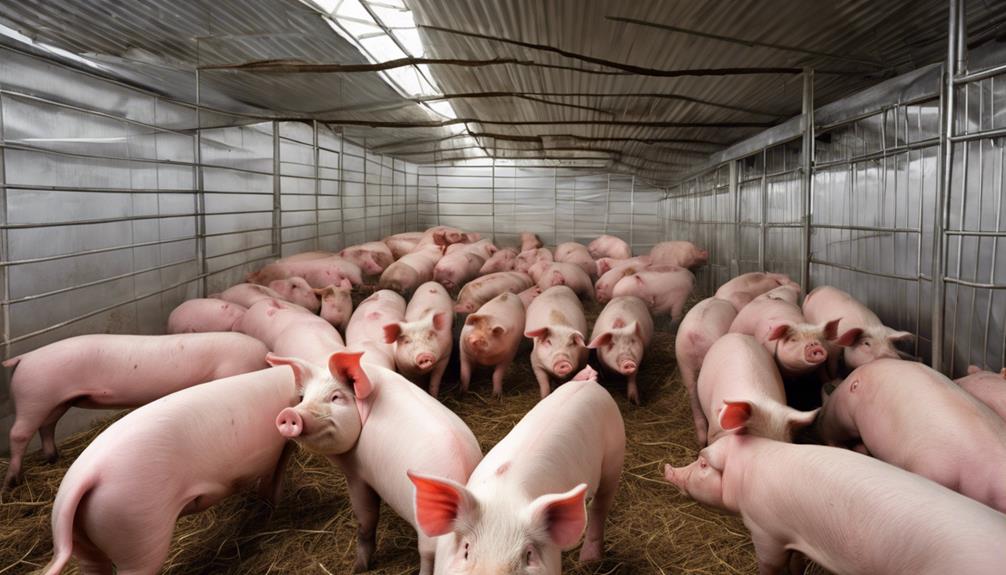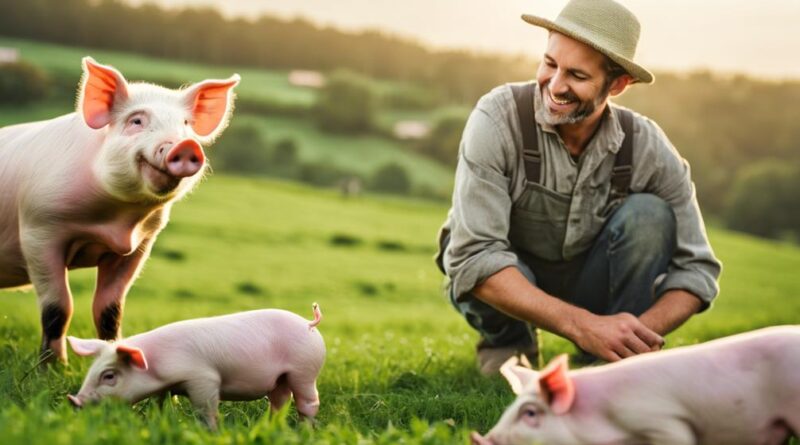7 Key Advantages of Organic Pig Farming
When it comes to organic pig farming, the pig is often viewed as a symbol of fertility and abundance. However, beyond this symbolism lie concrete advantages that may surprise you.
From the well-being of the animals to the quality of the meat produced, organic pig farming offers a range of benefits that go beyond just a label.
Let's break down these advantages and explore how they can impact not only the pigs but also the environment and consumers.
Improved Animal Welfare
With organic pig farming, animals experience improved welfare due to the implementation of ethical practices and natural living conditions. These practices ensure that pigs are raised in a way that prioritizes their well-being and health. By focusing on ethical practices, organic pig farmers provide a stress-free environment for the animals, allowing them to exhibit natural behaviors and live in a more comfortable setting.
One key aspect of improved animal welfare in organic pig farming is the enhanced nutrition that the pigs receive. Organic pig farmers prioritize feeding their animals high-quality, organic food that's free from harmful chemicals and additives. This results in healthier pigs that are less prone to diseases and have overall better well-being. Additionally, these ethical practices extend to the living conditions of the pigs.
Organic pig farming promotes natural living conditions, such as access to outdoor spaces, clean living areas, and the freedom to roam and socialize. These conditions not only improve the physical health of the pigs but also contribute to their mental and emotional well-being. By allowing pigs to engage in natural behaviors like rooting and exploring, organic pig farming provides a more enriching and fulfilling life for the animals.
Healthier Meat Products
Enhancing the well-being of pigs through organic farming practices leads to the production of healthier meat products for consumers. Organic pig farming focuses on providing pigs with a natural environment, access to outdoor spaces, and a diet free from artificial additives and antibiotics. As a result, the meat from organically raised pigs offers various nutritional benefits compared to conventionally raised counterparts.
Consumers are increasingly demanding healthier and more natural food options, driving the popularity of organic meat products. Organic pig farming meets this demand by producing meat that's free from harmful chemicals, hormones, and antibiotics. The meat from organically raised pigs is leaner and higher in beneficial nutrients such as omega-3 fatty acids and antioxidants. These nutritional advantages not only contribute to better overall health but also enhance the flavor and quality of the meat.
In addition to the absence of synthetic chemicals in organic pig farming, the focus on allowing pigs to roam outdoors and forage naturally results in meat that's more flavorful and nutrient-dense. By choosing organic meat products, consumers can enjoy meat that isn't only healthier but also supports sustainable and ethical farming practices. As consumer awareness of the benefits of organic meat continues to grow, the demand for organically raised pork is expected to rise, making it a promising sector in the agricultural industry.
Environmental Sustainability
Promoting environmental sustainability is a core principle of organic pig farming practices. By implementing sustainable practices, organic pig farming aims to minimize its carbon footprint and contribute to a healthier planet. One key aspect of environmental sustainability in organic pig farming is the use of natural and organic feed for the pigs. Unlike conventional farming that often relies on chemically-treated feed, organic pig farming focuses on feeding the pigs with organically grown crops, reducing the overall environmental impact.
Another important sustainable practice in organic pig farming is the maintenance of natural habitats and ecosystems within the farm. Organic pig farmers prioritize creating a balanced environment where pigs can interact with nature freely. This not only improves the well-being of the pigs but also helps in preserving biodiversity and supporting natural ecosystems on the farm.
Additionally, organic pig farming emphasizes waste management techniques that minimize environmental harm. Organic pig farmers utilize innovative methods such as composting pig waste to create organic fertilizers for crops, reducing the need for chemical fertilizers that can pollute the soil and water sources. These practices not only benefit the immediate farm environment but also contribute to the overall sustainability of agricultural practices. By choosing organic pig farming, you're actively supporting sustainable practices that reduce the carbon footprint and promote a healthier environment for future generations.
Reduced Chemical Usage
Implementing organic pig farming practices results in a significant reduction in the usage of harmful chemicals commonly found in conventional pig farming methods. By opting for organic pig farming, you can minimize the reliance on synthetic pesticides, antibiotics, and other chemical inputs that can have detrimental effects on the environment, animal health, and food safety.
One way organic pig farming achieves reduced chemical usage is through the implementation of alternative feeds. Organic pig farmers often utilize natural feed sources such as organic grains, legumes, and forages. By feeding pigs a diet free from synthetic additives, hormones, and genetically modified organisms, you can eliminate the need for chemical-laden feed supplements commonly used in conventional pig farming.
Moreover, organic pig farming promotes the use of natural remedies to prevent and treat common health issues. Instead of routinely administering antibiotics and medications, organic farmers rely on holistic practices like herbal supplements, essential oils, and homeopathic treatments. These natural remedies not only support the overall well-being of the pigs but also reduce the introduction of pharmaceutical residues into the environment.
Enhanced Soil Fertility
To improve soil fertility in organic pig farming, consider incorporating natural fertilizers and crop rotation practices. By using natural fertilizers such as compost and manure, you can enhance soil structure, increase nutrient content, and promote beneficial microbial activity. These organic materials provide a slow release of nutrients, preventing nutrient leaching and promoting sustainable soil health. Additionally, crop rotation helps maintain soil fertility by alternating the types of crops grown in a particular area. This practice helps prevent nutrient depletion and reduces the buildup of pests and diseases specific to certain crops.
Organic pig farming also contributes to enhanced soil fertility through increased biodiversity. By avoiding the use of chemical pesticides and fertilizers, organic farms support a diverse range of organisms in the soil ecosystem. This biodiversity improves soil structure, nutrient cycling, and overall soil health. Furthermore, organic pig farming promotes nutrient recycling within the system. Pig manure, a valuable source of nutrients, can be composted and returned to the soil to enrich its fertility. This closed-loop system reduces the need for external inputs and minimizes waste production.
Access to Niche Markets
Expanding your organic pig farming operation can open doors to niche markets that value sustainable and ethically produced pork products. By tapping into these markets, you can cater to the increasing market demand for organic and ethically sourced food products. Consumers are becoming more conscious of their food choices, preferring products that aren't only healthy but also produced in an environmentally friendly and humane manner.
Market Demand: Niche markets are willing to pay a premium for organic pork products due to the rising demand for ethically sourced food items.
Consumer Preference: Consumers are actively seeking out organic pig farming products that align with their values of sustainability and animal welfare.
Differentiation: Accessing niche markets allows you to differentiate your products from conventional pork offerings, attracting consumers looking for premium, sustainable options.
Lower Risk of Contamination

By focusing on organic pig farming, you can significantly reduce the risk of contamination in your pork products, ensuring higher quality and safety for consumers. Organic pig farming practices lead to decreased pollution levels compared to conventional methods. This decrease in pollution is beneficial not only for the environment but also for the overall quality of the meat produced.
One of the key factors contributing to the lower risk of contamination in organic pig farming is increased biosecurity measures. By implementing strict biosecurity protocols, organic pig farmers can prevent the entry and spread of harmful pathogens on their farms. This results in a cleaner and safer environment for the pigs, reducing the chances of contamination in the meat.
Furthermore, organic pig farming often involves a more natural and holistic approach to raising pigs. This means that the pigs have access to outdoor areas, fresh air, and natural vegetation, which can contribute to their overall health and well-being. Healthy pigs are less prone to diseases, reducing the need for antibiotics and other medications that can potentially contaminate the meat.
Economic Viability
With careful financial planning and strategic management, organic pig farming can prove to be economically viable for farmers looking to invest in sustainable practices. When considering the economic viability of organic pig farming, it's essential to take into account factors such as cost efficiency and market demand.
- Cost Efficiency: Organic pig farming can lead to cost savings in the long run. While initial setup costs may be slightly higher due to organic feed and farming practices, organic farming can reduce the need for expensive chemicals and antibiotics. Additionally, organic pig farming promotes sustainable practices that can lead to lower overall operating costs over time.
- Market Demand: There's a growing consumer demand for organic products, including organic pork. By investing in organic pig farming, you can tap into this expanding market and potentially command higher prices for your organic pork products. Meeting the increasing consumer preference for organic, ethically produced meat can give you a competitive edge in the market.
- Sustainability: Organic pig farming aligns with sustainable agriculture practices, which can have long-term benefits for both the environment and your farm's profitability. By adopting organic farming methods, you contribute to a healthier ecosystem while also ensuring the long-term productivity of your farm.
Frequently Asked Questions
What Are the Specific Requirements for Organic Certification in Pig Farming?
To get organic certification in pig farming, you've got to meet specific requirements for regulatory compliance. The certification process involves thorough inspections and documentation to ensure organic standards are met.
It's vital to maintain detailed records of feed sources, health care practices, and overall farm management. By adhering to these guidelines, you can demonstrate your commitment to producing organic pork products that meet the strict criteria for certification.
How Do Organic Pig Farms Manage Pest Control Without the Use of Chemicals?
To manage pest control without chemicals on organic pig farms, you can use natural methods like integrated pest management. This approach involves techniques such as introducing beneficial insects, rotating crops, and maintaining habitat diversity to keep pests in check.
Are There Any Specific Challenges or Limitations to Organic Pig Farming That Farmers Should Be Aware Of?
When it comes to organic pig farming, challenges can include stricter regulations, higher production costs, and potential disease outbreaks.
However, solutions like proper herd management, preventive healthcare measures, and strategic marketing can help address these limitations.
What Are the Potential Benefits of Rotational Grazing in Organic Pig Farming?
When raising pigs organically, incorporating sustainable grazing techniques like rotational grazing can bring significant benefits.
This practice not only allows pigs access to fresh forage but also helps improve soil health by preventing overgrazing and promoting natural nutrient cycling.
How Do Organic Pig Farmers Ensure the Traceability and Transparency of Their Products in the Market?
To ensure traceability and transparency in the market, organic pig farmers maintain a meticulous supply chain. They prioritize accountability by tracking each stage of production. This level of detail builds consumer trust and ensures labeling compliance.
Conclusion
In conclusion, organic pig farming offers numerous benefits such as improved animal welfare, healthier meat products, and environmental sustainability.
By reducing chemical usage and enhancing soil fertility, organic pig farming also contributes to a healthier ecosystem.
Additionally, organic pig farming provides access to niche markets, lowers the risk of contamination, and can be economically viable in the long run.
Consider transitioning to organic pig farming to reap these advantages for yourself and the environment.
